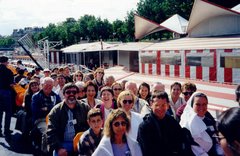Iraq banks on religious travel
Are the Devout Deterred by Violence? Holy Sites Hope Not, Try to Woo Tourists
Article website: http://abcnews.go.com/Travel/story?id=4866068&page=1
By Andrea Stone, USA TODAY
BAGHDAD
The Iraq Tourism Board isn't exactly a welcoming place.
Located on Haifa Street, once so dangerous it was called Fallujah after the blood-drenched city in Anbar province, its building is hidden behind blast walls. Entrance arcades are bricked up and finished off with menacing shards of glass.
These days, says board chairman Hamoud Al-Yakobi, tourism is a matter of faith. Literally.
"We depend on religious tourism," Al-Yakobi says. "There is no other tourism business here."
Five years after the U.S. invasion of Iraq, nearly all its tourists are Shiite pilgrims from Iran flocking to holy sites in Najaf, Karbala and other southern cities. Last year, more than 500,000 Iranian tourists crossed the border; 160,000 had come by the end of April this year.
A recent tourism conference in Najaf, home to the shrine of the Imam Ali, focused on building hotels and improving services for the devout, who have been less deterred by continuing violence.
In contrast, the Iraq Tourism Board has no offices in the USA and no immediate plans to woo intrepid Westerners. The latest issue of the board's tourism magazine is printed only in Arabic. Past editions also included English.
Al-Yakobi knows that it would take a leap of faith to get Western tourists back to the land between the Tigris and Euphrates. Ancient Mesopotamia may have been the cradle of civilization, but modern-day Iraq remains a basket case.
"We need more time," Al-Yakobi says, "because of the security situation."
American tourists are not permitted to travel independently in Iraq without an escort and must come as part of an organized group, Al-Yakobi says. Several Iraqi companies offer group tours complete with security.
"Tourists need protection against kidnapping," he says.
They also need basic amenities, many of which are lacking here. Nearly a dozen Baghdad hotels, including the Al-Hamra in the Karada district, claim "five-star" ratings. Discerning travelers might quibble, though, because most luxury hotels don't have dripping faucets, clanking air conditioners and a 12-page room-service menu that rarely can deliver enough dishes to fill one.
There are some signs of progress, however.
Published reports say the Pentagon is backing a five-year, $5 billion plan to build luxury hotels and shopping malls inside Baghdad's heavily fortified Green Zone. Marriott is said to have agreed to build a hotel there. So far, the only groundbreaking being done is by the rockets and mortars that almost daily land inside the international compound.
More solid is a recently announced deal worth $5.5 billion to buy 40 commercial aircraft from Boeing and 10 planes from Canada's Bombardier to give a much-needed upgrade to Iraqi Airway's aging fleet. Boeing also will help Iraq move its airports closer to international standards. Al-Yakobi says new airports will soon open in Mosul and Najaf.
Mosul is near the sites of the ancient cities of Nineveh and Nimrud. Yet as a hotbed of al-Qaeda, this must-see on any tourist itinerary remains a definite no-go.
Barbed wire and blast walls may be the most common sights in Iraq these days, but they are nowhere to be found in tourist brochures and posters put out by the government.
Those pristine southern marshes in southern Iraq? Drained by Saddam Hussein and only now being restored. Samarra's Mosque of the Golden Dome, one of the holiest sites in Shiite Islam? Bombed twice since 2006, its dome and minarets destroyed. The ancient city of Babylon? Trampled by U.S. and Polish military forces before being handed back to the government in 2005. And those grizzled tea sellers pouring their steaming wares in some exotic bazaar? Few Westerners dare step foot in one these days.
Still, Al-Yakobi doesn't want to discourage adventurous Americans who might be weighing a visit.
"We advise them to come," he says. As long as they don't venture out on their own, "it will not be dangerous for them. We will protect them."
Contributing: The Associated Press
Copyright © 2008 ABC News Internet Ventures
http://abcnews.go.com/Travel/story?id=4866068&page=1
Revenue Secrets from Faith Tourism Experts
5 Step Introduction to the Religious Travel Market
Daily Religious Tourism News
Religious Travel Links
About Me

- kevinjwright
- Kevin J. Wright is one of the world's most recognized religious travel and hospitality authorities. He founded and served as President of the World Religious Travel Association, the leading organization dedicated to the 300 million traveler faith tourism industry. He also served as Chairman of the World Religious Travel Expo, drawing more than 30 countries from around the world. Wright has been interviewed by the CBS Early Show, TIME Magazine, USA TODAY, Wall Street Journal, The New York Times, National Public Radio (NPR), National Geographic, Forbes Traveler, Los Angeles Times, Boston Globe, and dozens of other media outlets. He is the author of four travel guidebooks.
Faith-based Tourism

300 million travelers worldwide
Blog Archive
- January (1)
- December (2)
- November (2)
- October (5)
- September (3)
- August (8)
- July (1)
- June (3)
- May (3)
- April (3)
- March (9)
- February (5)
- January (9)
- December (4)
- November (2)
- October (16)
- September (8)
- August (6)
- July (3)
- June (18)
- April (2)
- November (2)
- September (11)
- August (7)
- July (12)
- June (13)
- May (5)
- April (6)
- March (4)
- December (2)
- November (6)
- October (2)
- September (2)
- August (3)
- July (8)
- June (15)
- May (4)
- April (7)
- March (2)
- February (5)
- January (5)
- December (5)
- August (1)
- July (1)
